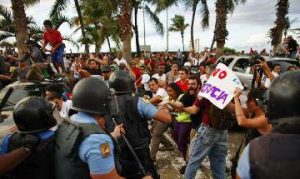
Strike at University of Puerto Rico, Spring 2017
Earlier this summer, I went on a study-abroad trip with my class and discovered the many inequalities and the social activism that is going on in Puerto Rico. We often forget that Puerto Rico is still a colony. Not only is there a class division but the people are at the mercy of the U.S. imperialist power.
Puerto Rico has been a U.S. colony since 1898 after the U.S. took the island from Spain in the Spanish-American war. Over the last century, the U.S. has caused social, economic, and political distress upon the island.
The U.S. exploited the land when it became a huge sugar plantation, ruining their local agriculture. American corporations displaced male workers who couldn’t afford to feed their families, and factories encouraged the sterilization of female workers, so that they codul continue working without taking maternity leave.
In other words, Capitalism was a beast that fed off of the working class of Puerto Rico by exploiting them for their cheap labor and hurting their quality of life.
Puerto Rico currently owes about $73 billion in bonds. Most of the money is from capitalist interest to U.S. investors. They also owe $50 billion in unfunded pension liabilities. To add to that, a significant amount of the debt comes from past governors who asked for loans from the banks without the people’s permission.
In 2016, the US Congress passed the Puerto Rico Oversight, Management, and Economic Stability Act (PROMESA). It established a financial oversight board, called La Junta de Control Fiscal.This board is made up of seven people who have a direct link with wall street and can override any law, policy, and government action in Puerto Rico.
The little democracy that Puerto Rico had as a colony is now shattered through this law. This means that health, social, and educational programs will be cut, workers’ wages and hours will be lowered, and the cost of living will rise. They are asking for money that residents don’t know if it is legitimate.
The island is currently divided politically between statehood and independence. Many Puerto Ricans believe that if they become a state, they would have equal rights, and their quality of life would be better. Other people, especially the youth, believe that independence from the US would be the answer to Puerto Rico’s economic troubles.
However, the problem is the capitalist system, not their current status, that has caused the poor to become poorer and the rich to become richer. Also, the debt was created by capitalist interests. The class struggle is obvious in Puerto Rico. A huge portion of the population currently lives in poverty and is unemployed. Independence would not solve the people’s sufferings and economic troubles.
National Liberation Movements after World War II turned colonies into capitalist countries. The bourgeois led the independence movements in Indonesia, Latin America, Africa, India and so forth. There is still class division in these countries, where the poor are working for the rich and the rich are profiting from people’s suffering.
So, poverty will not end if Puerto Rico becomes a state or independent country. Under capitalism, the working class would still be wage slaves who barely survive off their paid labor.
With a communist system, countries would not be in debt because there would be no currency. The people would not have to labor to pay a debt they did not cause. Most importantly, with communism, no one will be homeless or starving. We will all have access to the same social, health, and educational resources.
It’s important to realize that the power is in the masses, not the seven people who currently have control over Puerto Rico’s health, social, and educational programs. The masses are stronger and bigger than the elite!

